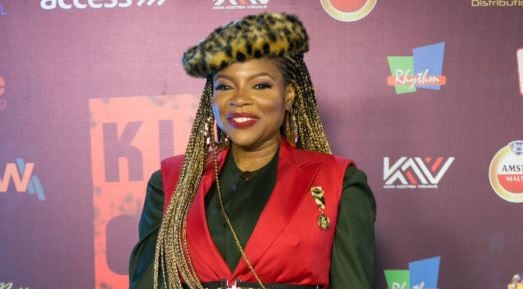Films often rely on the celebrity influence of its star actors to sell tickets, generate publicity and attain cultural relevance. You see, people easily remember, recognise and celebrate actors. The same cannot be said of the filmmakers behind the camera — who often don’t have, or desire, celebrity status.
Mostly unknown outside the film industry circle, directors and writers lack the social currency to push a film on their own. This relative anonymity affords such filmmakers an opportunity to fail and churn out terrible films. Unless of course, you are Kemi Adetiba, intent on proving a point and stamping your name on history’s walls.
If there’s anything we’ve learnt, it is that Adetiba has successfully found ways to stay culturally relevant, achieving and maintaining her celebrity while still staying behind the camera, telling stories.
For as long as a millennial’s mind can conjure, Adetiba has been in the media, presenting radio and TV shows. But, just as the last decade was fading away, Adetiba slowly and steadily pivoted from being a voice/face presenting, to the hands directing and creating behind the scenes. She first began producing music videos, effectively leveraging her celebrity connections in a way every entrepreneur or freelancer would envy.
But then, the self-titled Bruce Lee of visuals wasn’t as prolific as her other music director colleagues — like Clarence Peters, Unlimited LA, Sesan Ogunro. And she was the only woman pushing through in an industry heavily dominated, across board, by men.
THE WEDDING PARTY
In 2016, Adetiba directed her first feature film, The Wedding Party, featuring a vast array of celebrity cast. The film was a popular and commercial hit, but not so much with critics and commentators.
Still, TWP was a watershed moment in Nollywood, becoming a critical marker in the development of Nollywood and Nigerian cinema — economically and culturally. Over the last two years, rom-coms, weddings and marriage have become a favourite amongst Nigerian filmmakers, each struggling to out-tell the same over-flogged story again and again.
For reasons best known to Adetiba and the producers behind TWP, she didn’t return for the movie’s over bloated, if not irritating, sequel.
KING OF BOYS
Then came Adetiba’s second feature film, ‘King of Boys’, featuring Sola Sobowole, Reminisce, Adesua Etomi, amongst several others, released last week. Steadily through this year, Adetiba teased with the film, whipping up her fans and industry watchers into a frenzy, getting her troops behind her.
Kemi Adetiba and her crew somehow managed to muscle up a tremendous amount of organic publicity for the film, seemingly expanding little resources while aggressively relying on the social currency Adetiba wields. To her credit, Adetiba took full advantage of this currency to market her film, using Instagram to immerse her followers in the process: from the late night movie edits; to her fears, despondency and cliched inspirational quotes; the series of posts about foreign popular gang leaders, and suggestions about costumes to her own movie premiere.
It was hard not to root for this movie and its makers.
King of Boys isn’t TWP which had Mo Abudu and her well-oiled media machinery as a strong force, aggressively pushing across multiple fronts to promote it. For her new movie to be a success (ie. commercially and culturally), Adetiba knew she had to rely on her wits and hustle to pull it off. And she did.
Adetiba’s personal promotional efforts ran parallel to that of the movie’s stars too. But it was easy to see that for Adetiba, more than anyone else, this was personal, an opportunity to prove to everyone that the success of TWP wasn’t just beginners luck or a fluke, that she isn’t here to play.
It is yet to be seen if King of Boys would be a critical success — the fanfare might be there, the moviegoers might fawn about it on social media, but early reviews have been ambivalent about it, neither here nor there. But it is, obviously, too early to tell.
But if there is anything we are sure of, King of Boys, much like TWP, would set a new trend as other filmmakers attempt to copy the recipe set out by Kemi Adetiba.
Copyright 2024 TheCable. All rights reserved. This material, and other digital content on this website, may not be reproduced, published, broadcast, rewritten or redistributed in whole or in part without prior express written permission from TheCable.
Follow us on twitter @Thecablestyle

